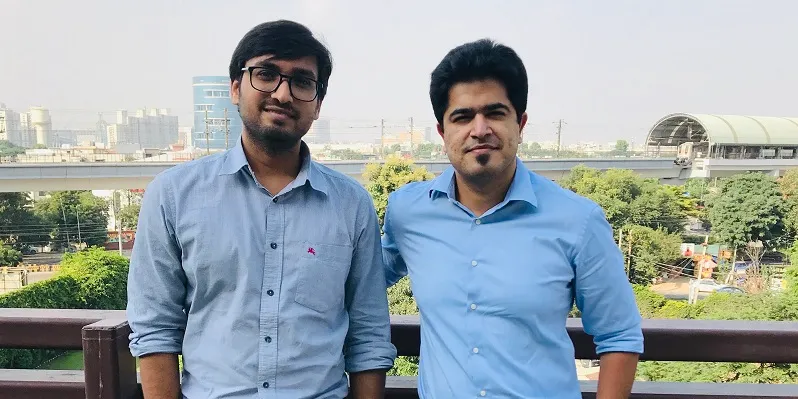This Delhi-based healthtech startup wants to become the Siri for doctors
Healthtech startup Navia Life Care uses AI, ML, and predictive analysis to power its products, which include a voice assistant for doctors and a check-in management system for clinics and hospitals.
‘Turn on the lights.’
‘Dim the lights.’
‘Play the next song.’
These are only few of the many commands that we give our home and phone assistants. What if we could use the same technology to empower medical service providers and make hospital visits more efficient? Delhi-based Navia Life Care aims to do just that with its voice-powered digital assistant for doctors and queue management system for clinics and hospitals.
Navia was founded by ISB graduate Gaurav Gupta and his friends Kunal Kishore Dhawan, and Shourjo Banerjee in 2016. Kunal and Gaurav had met for a consulting project and eventually decided to join hands to use technology to solve problems of the healthcare ecosystem.
Shourjo, a friend of Kunal’s, also joined them.

Gaurav Gupta and Kunal Kishore Dhawan, Founders of Navia Life Care
“The idea behind Navia has come from real problems faced by us during our visits to the doctor,” Kunal says.
Kunal holds a Master’s degree in Biotechnology and Management from Carnegie Mellon University, US, and has worked in the healthcare industry for almost eight years. Gaurav on the other hand, has experience of running chemical, and social impact businesses. He specialises in strategy, business development, and marketing.
Shourjo, a graduate from the University of Wisconsin-Madison, US, has previously worked at Freescale Semiconductors as a software engineer. He also holds a patent on network architecture, and is currently on a sabbatical from Navia, and keen to pursue his higher education.
Apart from the co-founders, the team consists of 16 members.
“The team has grown 8x in the last one year,” says Kunal, who does not wish to divulge their initial investment.
Empowering healthcare providers
Navia is a B2B SaaS startup. Their key customers include individual doctors and hospitals; all they need to do is sign up on their website. The first month of usage is free. However, after that, doctors and hospitals “can buy an annual licences”, Kunal says.
Navia’s flagship product NAVI is an artificial intelligence (AI)-enabled voice assistant for doctors. NAVI is used to create shareable and printable digital prescriptions in less than 30 seconds, which helps doctors and patients to keep records safe in one place.
Navia QM, on the other hand, is an OPD efficiency tool to optimise patient wait time and increase the efficiency of the front office staff. It not only helps in improving patient experience but also enables the doctor/hospital to see more patients by managing the queue.
Their last product, Navia SMART, helps improve clinical and financial outcomes. It is a modular and network-enabled suite that helps care provides leverage technology to build, maintain, and improve relationships with their patients. Navia SMART can be plugged into the existing IT architecture to use data analytics and provide insights to customers. It implements AI, machine learning (ML), and predictive analytics.
Navia sells annual licences of its products to customers. It partners with pharmaceutical, diagnostic, and technology companies to acquire customers.
Focusing on pain points
Creating these products was, however, not easy. Team Navia spent two years understanding the user’s pain points.
“Spending time with doctors and inside hospitals gave us a clear understanding of what ails the system, and how they are likely to respond to new technologies or digital solutions,” Kunal says.

Navia at present works with about 75 hospitals and clinics, and over 300 doctors currently use their solutions.
Their in-house tech team designed the products. Navia at present works with about 75 hospitals and clinics, and over 300 doctors currently use their solutions.
“Our platform is being used to treat about 100,000 patients as of now,” Kunal says.
The numbers game
Navia has so far raised about Rs 1.1 crore across two rounds.
Their key investor is Benori Ventures, led by Ashish Gupta, ex-COO of Evaluserve. Other notable investors include Sorabh Agarwal, a finance professional; Dr Rahul Verma, a seasoned senior executive; and Mayank Mamtani, a healthcare-focused investment banking professional.
“Our annual renewal rate is near to 100 percent,” Kunal says.
In the pink of health
According to IBEF, the Indian healthcare sector is “growing at a brisk pace due to its strengthening coverage, services and increasing expenditure by public as well private players”. The healthcare market is expected to reach $372 billion by 2022, driven by "rising incomes, greater health awareness, lifestyle diseases, and increasing access to insurance".
Navia competes with the likes of My Healthcare, Consure Medical, Doctalk, Lybrate, and Mfine. What differentiates this healthtech startup from the rest? The simplicity of its products – doctors create prescription within a minute using a voice assistant.
“Our products are very simple for the doctors to use; there is no change of behaviour required by the doctor or other stakeholders,” Kunal says.
Moreover, Navia has an innovative business model – instead of being feet-on-street heavy, it is looking at the expansion of business through partnerships, which help in creating credibility in the industry.
Navia now has plans to launch its operations overseas. “We are working hard in making our product compliant for other countries and are currently exploring the Middle East and Southeast Asian markets,” Kunal says. “We will also raise pre-Series A funding in the next three months.”
(With inputs from Charu Mohan)



![[Startup Bharat] Kollam-based Waferchips makes ECG monitoring easy and on the go](https://images.yourstory.com/cs/2/3fb20ae0-2dc9-11e9-af58-c17e6cc3d915/Biocalculus1556028195927.png?fm=png&auto=format&h=100&w=100&crop=entropy&fit=crop)
![[Startup Bharat] Here’s why this IIT alumnus moved to Kochi to grow his medical device startup](https://images.yourstory.com/cs/2/3fb20ae0-2dc9-11e9-af58-c17e6cc3d915/Bagmo-Team1557222860028.png?fm=png&auto=format&h=100&w=100&crop=entropy&fit=crop)





